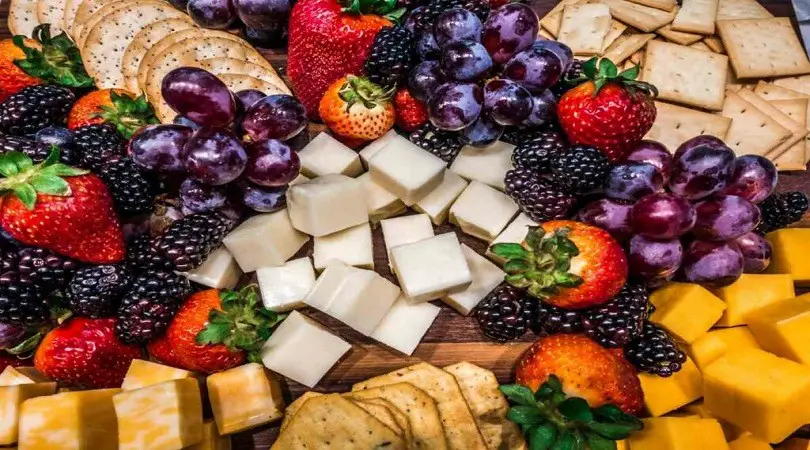Last Updated on January 6, 2025
Yes, it is safe to eat charcuterie while pregnant as long as it is properly cooked. Charcuterie refers to cured and preserved meats, such as salami and prosciutto, which can pose a risk of foodborne illnesses if consumed raw or undercooked.
However, when heated thoroughly, these meats are safe to eat during pregnancy as they eliminate any potential bacteria. Nevertheless, it is always a good idea to consult with your healthcare provider before making any dietary decisions while pregnant. Pregnancy is a time when women need to be cautious about what they consume to ensure the health and well-being of both themselves and their developing baby.
One particular question that often arises is whether it is safe to enjoy charcuterie during pregnancy. Charcuterie is a term used to describe a variety of cured and preserved meats, such as salami, prosciutto, and cured sausages. These meats are typically enjoyed in dishes like sandwiches, antipasti platters, and charcuterie boards. However, due to the risk of foodborne illnesses, pregnant women may be unsure about whether they can safely consume these tasty treats. We will explore the safety of eating charcuterie while pregnant and provide some guidelines to help you make informed dietary choices during pregnancy.
Related: Can I Eat Coleslaw While Pregnant?
Understanding Charcuterie: What Is It And Why Is It Popular?
Charcuterie has become a trendy and popular food choice for many, but what exactly is it and why is it so appealing? Let’s dive into the definition, origins, variety of options available, and the overall popularity of charcuterie boards.
Definition And Origins Of Charcuterie
Charcuterie refers to a wide range of cured meats, sausages, pâtés, and other preserved meat products. This culinary practice originated in france, where it was developed as a way to preserve meat before the advent of refrigeration. Key points to understand about charcuterie include:
- Charcuterie encompasses various methods of preserving and enhancing meat flavors, such as curing, smoking, and fermenting.
- The term “charcuterie” is derived from the french words “chair” meaning flesh and “cuit” meaning cooked.
- Charcutiers, skilled artisans specialized in the craft of charcuterie, have been creating these delicacies for centuries.
Variety Of Charcuterie Options Available
When it comes to charcuterie, the options are abundant. Let’s explore the diverse range of choices you might find on a charcuterie board. Here are some popular examples:
- Cured meats: From classics like prosciutto, salami, and soppressata to more unique options like bresaola and pancetta.
- Pâtés and terrines: Savory spreads made from ground meats, herbs, spices, and often fortified with ingredients like liver or truffles.
- Rillettes and confits: Meat that has been slow-cooked in its own fat until tender and then shredded.
- Sausages: Fresh or dried sausages, such as chorizo, merguez, or italian sausage, offer a burst of flavors.
- Accompaniments: Cheese, pickles, olives, bread, crackers, mustard, and fruit can complement the meaty elements of a charcuterie board.
Popularity And Appeal Of Charcuterie Boards
Charcuterie boards have garnered popularity for several reasons. Here’s what makes them so appealing:
- Artistic presentation: Charcuterie boards are visually stunning, often featuring an arrangement of different shapes, colors, and textures. The presentation alone can make one’s mouth water.
- Variety and customization: These boards offer a wide array of flavors and textures to suit different tastes. With choices ranging from salty to earthy to spicy, there is something for everyone.
- Social and sharing experience: Charcuterie boards create a communal dining experience, encouraging sharing, conversation, and exploration of flavors together.
- Versatility: Charcuterie boards are suitable for various occasions, from casual gatherings to formal events. They can be enjoyed as appetizers, light meals, or even as the main course.
- Pairing possibilities: The combination of cured meats, cheeses, bread, and condiments allows for endless opportunities to create complementary flavor profiles with wines, beers, and other beverages.
The allure of charcuterie extends beyond its delicious flavors. It encompasses the traditions, craftsmanship, and artistry behind its creation. Whether you’re a meat lover, a food explorer, or a social gatherer, the enjoyment of charcuterie is an experience that continues to captivate people around the world.
Risks And Precautions: Safety Concerns During Pregnancy
Pregnancy is a crucial time for a woman’s health, as what she consumes directly affects the well-being of both her and her baby. While charcuterie may be a delightful treat, it’s essential to be aware of the risks and take necessary precautions when indulging in these delicacies during pregnancy.
Here are some key points to consider:
Importance Of Avoiding Certain Foods While Pregnant
- During pregnancy, it is crucial to avoid certain foods that pose a potential risk of causing harm to the mother and her developing baby. Foods that are raw, undercooked, or unpasteurized fall into this category.
- Raw or undercooked charcuterie, such as cured meats like salami, prosciutto, or chorizo, can harbor harmful bacteria or parasites that may lead to foodborne illnesses, such as listeriosis.
- Listeriosis, caused by the bacteria listeria monocytogenes, can be particularly dangerous during pregnancy as it is associated with an increased risk of miscarriage, stillbirth, premature delivery, or severe illness in newborns.
Potential Risks Associated With Consuming Unpasteurized Products
- Unpasteurized charcuterie products, such as certain soft cheeses and some sausages, may contain harmful bacteria such as listeria or other pathogens that can cause foodborne illnesses.
- Listeria can easily cross the placenta and infect the developing baby, leading to serious health complications. These can include preterm labor, life-threatening infections, and developmental issues.
- Pregnant women are approximately 10 times more likely to contract a listeria infection compared to the general population, making it crucial to take extra precautions during pregnancy.
Related: Can Pregnant Ladies Eat Creme Brulee?
Precautions To Take When Selecting And Preparing Charcuterie
- When it comes to enjoying charcuterie during pregnancy, certain precautions can help minimize the risk of foodborne illnesses:
- Opt for pre-packaged, fully-cooked charcuterie products, as these have undergone a thorough heating process to eliminate harmful bacteria.
- Always read labels carefully to ensure that the products have been pasteurized, meaning they have undergone a heat treatment that kills potential pathogens.
- Avoid consuming homemade or artisanal charcuterie, as these products are more likely to be unpasteurized and carry a higher risk.
- If uncertain about the safety of a particular charcuterie product, it’s best to err on the side of caution and consult a healthcare professional.
- Proper storage is crucial; make sure to keep charcuterie refrigerated below 40°f (4°c) to discourage bacterial growth.
- Thoroughly wash hands, utensils, and surfaces after handling any raw or undercooked charcuterie to prevent cross-contamination.
By being aware of the importance of avoiding certain foods and understanding the potential risks associated with consuming unpasteurized products, you can take necessary precautions when selecting and preparing charcuterie during pregnancy. Prioritizing your own and your baby’s health is key, and by following these guidelines, you can savor charcuterie safely.
Making Safe Choices: Guidelines For Enjoying Charcuterie During Pregnancy
Enjoying a tasty charcuterie board can be a delightful culinary experience, but if you’re pregnant, you may have some concerns about whether it’s safe for you and your baby. The good news is, with a few guidelines in mind, you can still enjoy charcuterie while pregnant.
In this section, we will discuss identifying safe charcuterie options, proper handling and storage of charcuterie products, and recommendations from experts on consuming charcuterie during pregnancy.
Identifying Safe Charcuterie Options
When it comes to selecting charcuterie products during pregnancy, it’s important to choose options that are safe and pose minimal risks. Consider the following guidelines:
- Opt for fully cooked charcuterie: To minimize the risk of harmful bacteria, such as listeria, choose fully cooked or cured charcuterie. This includes options like cooked ham, salami, or prosciutto.
- Avoid raw or undercooked charcuterie: Raw or undercooked charcuterie, such as rare or medium-rare meats, should be avoided during pregnancy. These products can potentially harbor bacteria that pose a risk to you and your baby.
- Look for pasteurized or cooked cheeses: Some charcuterie boards include cheeses, and it’s crucial to select pasteurized or cooked options. Unpasteurized cheeses, such as soft cheeses like brie or camembert, can be a source of harmful bacteria.
Proper Handling And Storage Of Charcuterie Products
To ensure the safety of charcuterie during pregnancy, proper handling and storage practices are essential. Follow these tips:
- Check expiration dates: Always check the expiration dates on charcuterie products and avoid consuming anything that has expired.
- Store at the appropriate temperature: Keep charcuterie products refrigerated at or below 40°f (4°c) to inhibit bacterial growth.
- Separate raw and cooked charcuterie: Prevent cross-contamination by storing raw and cooked charcuterie items separately in the refrigerator.
- Practice good food hygiene: Wash your hands thoroughly before and after handling charcuterie. Additionally, ensure that knives and cutting boards used for charcuterie are clean and sanitized.
Recommendations From Experts On Consuming Charcuterie While Pregnant
While enjoying charcuterie during pregnancy can be safe if you follow proper guidelines, it’s always a good idea to consult with healthcare professionals for personalized advice. Here are some recommendations from experts:
- Consult your healthcare provider: Discuss your dietary concerns and charcuterie consumption with your healthcare provider. They can provide individualized advice based on your medical history and specific pregnancy needs.
- Balance your diet: Charcuterie should be enjoyed in moderation as part of a balanced and varied diet during pregnancy. Remember to include other nutritious foods like fruits, vegetables, whole grains, and lean proteins.
- Be aware of your body: If you experience any adverse reactions or discomfort after consuming charcuterie, contact your healthcare provider immediately.
Now that you have a better understanding of safe charcuterie choices, proper handling, and expert recommendations, enjoy your charcuterie board during pregnancy with peace of mind. Follow these guidelines, savor your favorite flavors, and cherish this time of culinary delights while taking care of yourself and your little one.
Related: Can I Eat Fried Calamari While Pregnant?
Frequently Asked Questions For Can You Eat Charcuterie While Pregnant?
Can You Eat Charcuterie While Pregnant?
Eating charcuterie during pregnancy is not recommended due to the risk of foodborne illnesses like listeriosis.
Is It Safe To Eat Cured Meats While Pregnant?
Cured meats, such as those found in charcuterie, may contain harmful bacteria and should be avoided during pregnancy.
What Risks Are Associated With Consuming Charcuterie During Pregnancy?
Consuming charcuterie while pregnant can increase the risk of listeriosis, which can be harmful to both the mother and the baby.
What Are The Alternatives To Charcuterie For Pregnant Women?
Pregnant women can opt for cooked meats and pasteurized cheeses as safer alternatives to enjoy a variety of flavors.
Conclusion
Overall, it is important to prioritize the health and safety of both the mother and the baby during pregnancy. When it comes to charcuterie, pregnant women should exercise caution and be aware of the potential risks. It is generally recommended to avoid consuming raw or undercooked meats, including certain types of cured meats found in charcuterie.
This is because they can carry harmful bacteria, such as listeria, which can pose a serious threat to the developing fetus. However, there are safer alternatives available. Opting for cooked or heated charcuterie options can significantly reduce the risk of bacterial contamination.
Additionally, it’s a good practice to purchase charcuterie from reputable sources and consume it promptly while it’s still fresh. By being mindful of these guidelines, pregnant women can still enjoy charcuterie while ensuring the health and well-being of themselves and their baby.











